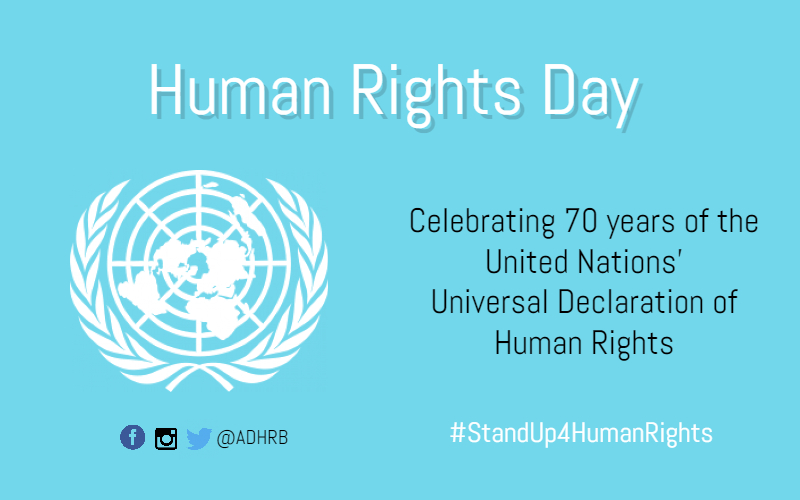11 December 2017 – Yesterday, 10 December 2017, marked International Human Rights Day, commemorating the 70th anniversary of the Universal Declaration of Human Rights (UDHR). In honor of this occasion, Americans for Democracy & Human Rights in Bahrain (ADHRB) reiterates our call for all governments around the world to protect and promote fundamental human rights without prejudice. Specifically, we call on the governments of Bahrain, Saudi Arabia, and the other members of the Gulf Cooperation Council (GCC) to curb their increasing violations of essential freedoms such as those to expression, assembly, association, and belief.
In Bahrain, the authorities have continued to intensify a violent and wide-ranging crackdown on all forms of peaceful dissent over the last year. Since January 2017, the Bahraini authorities have ended a de facto moratorium on capital punishment by executing three men tortured into providing false confessions; dissolved the last major opposition group, Wa’ad; suspended the last independent newspaper, Al-Wasat; amended the constitution to allow military courts to try civilians; convicted the country’s leading Shia cleric, Sheikh Isa Qassim, in an unfair trial; launched two bloody raids on peaceful sit-ins around Sheikh Isa Qassim’s home, leaving six demonstrators dead; and restored domestic arrest powers to the National Security Agency (NSA) – the intelligence service found to have overseen systematic torture, enforced disappearance, and extrajudicial killing in 2011 – among other severe abuses.
Throughout, the government has relentlessly suppressed all remaining vestiges of independent civil society, committing reprisals against activists and their families and effectively cutting of them off from the international community. Since 2011, Bahrain’s authorities have subjected nearly every human rights activist and political opposition figure to arbitrary arrest and detention, including human rights defenders like Abdulhadi al-Khawaja, Nabeel Rajab, and Ebtesam al-Saegh; Al-Wefaq Secretary-General Sheikh Ali Salman; Al-Wahdawi Secretary-General Fadhel Abbas; former Wa’ad Secretary-General Ebrahim Sharif; and scholar-activists Dr. Abduljalil al-Singace and Khalil al-Halwachi, among many others. The authorities have also intensified reprisals against exiled activists living outside Bahrain by targeting family members that remain in the kingdom. In October 2017, the government convicted three relatives of human rights defender Sayed Ahmed Alwadaei, director of advocacy at the London-based Bahrain Institute for Rights and Democracy (BIRD), in clear retaliation for his activism. Hajer Mansoor Hassan, Sayed Nizar Alwadaei and Mahmood Marzooq Mansoor were falsely accused under the country’s excessively broad anti-terror law, and were arrested, tortured, and ultimately convicted in an unfair trial that did not observed due process.
As in Bahrain, the Government of Saudi Arabia suppresses fundamental freedoms. There is no freedom of religion in Saudi Arabia; protests and demonstrations are banned; human rights, civil society, and political organizations are prohibited; and the government criminalizes many forms of expression and opinion. Due to these broad restrictions on fundamental freedoms, authorities systematically target, arrest, prosecute, and sentence political and civil society activists and human rights defenders. Many activists, including Waleed Abu al-Khair, the members of the Saudi Civil and Political Rights Association, and Raif Badawi are serving long prison sentences. Others, like Ali al-Nimr and Mujtaba al-Swaiket, are at risk of execution because of their activism.
Like its neighbors in Bahrain and Saudi Arabia, the United Arab Emirates (UAE) has worked to silence any peaceful dissent, targeting virtually all government critics for reprisal. The country’s most prominent human rights defender, Ahmed Mansoor, remains arbitrarily detained after being arrested in March 2017, and Dr. Nasser bin Ghaith, another leading scholar and activist in the UAE, has been sentenced to 10 years in prison on charges stemming from his exercise of the rights to free expression and association.
Meanwhile, across the GCC states, authorities have largely failed to address persistent human rights abuses arising out of statelessness, gender- and faith-based discrimination, human trafficking, and migrant labor exploitation. Between the devastating war in Yemen and the enduring diplomatic crisis surrounding Qatar, the Gulf has reached unprecedented levels of instability, further endangering the fundamental rights of its residents.
“The UN’s decision to adopt the Universal Declaration of Human Rights was a monumental step forward for human rights around the world, and it remains a source of inspiration,” said Husain Abdulla, ADHRB’s executive director. “Yet 69 years later, the basic human rights situation in the GCC states has stagnated – if not actively deteriorated in countries like Bahrain. Across the Gulf, rulers have consolidated authoritarian and corrupt governing systems through draconian legislation, expansive surveillance mechanisms, and brutal repression. At the same time, they have largely refused to tackle systemic issues like statelessness and migrant rights abuses, which remain nearly as entrenched in some states as they were decades earlier. On this important anniversary, the international community must work to ensure that the GCC states are held to those key standards and obligations laid out in the UDHR.”
Another year must not go by with such wide-ranging and severe violations of human rights in the Arab Gulf. ADHRB urges all of the GCC states to adhere to their international commitments to uphold fundamental freedoms and basic human rights, and additionally calls on their close international allies – like the United States and United Kingdom – to play a positive role in guaranteeing these protections.





